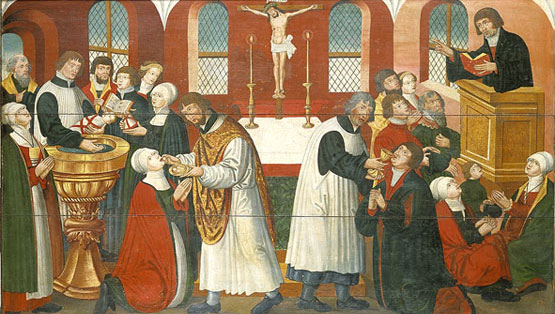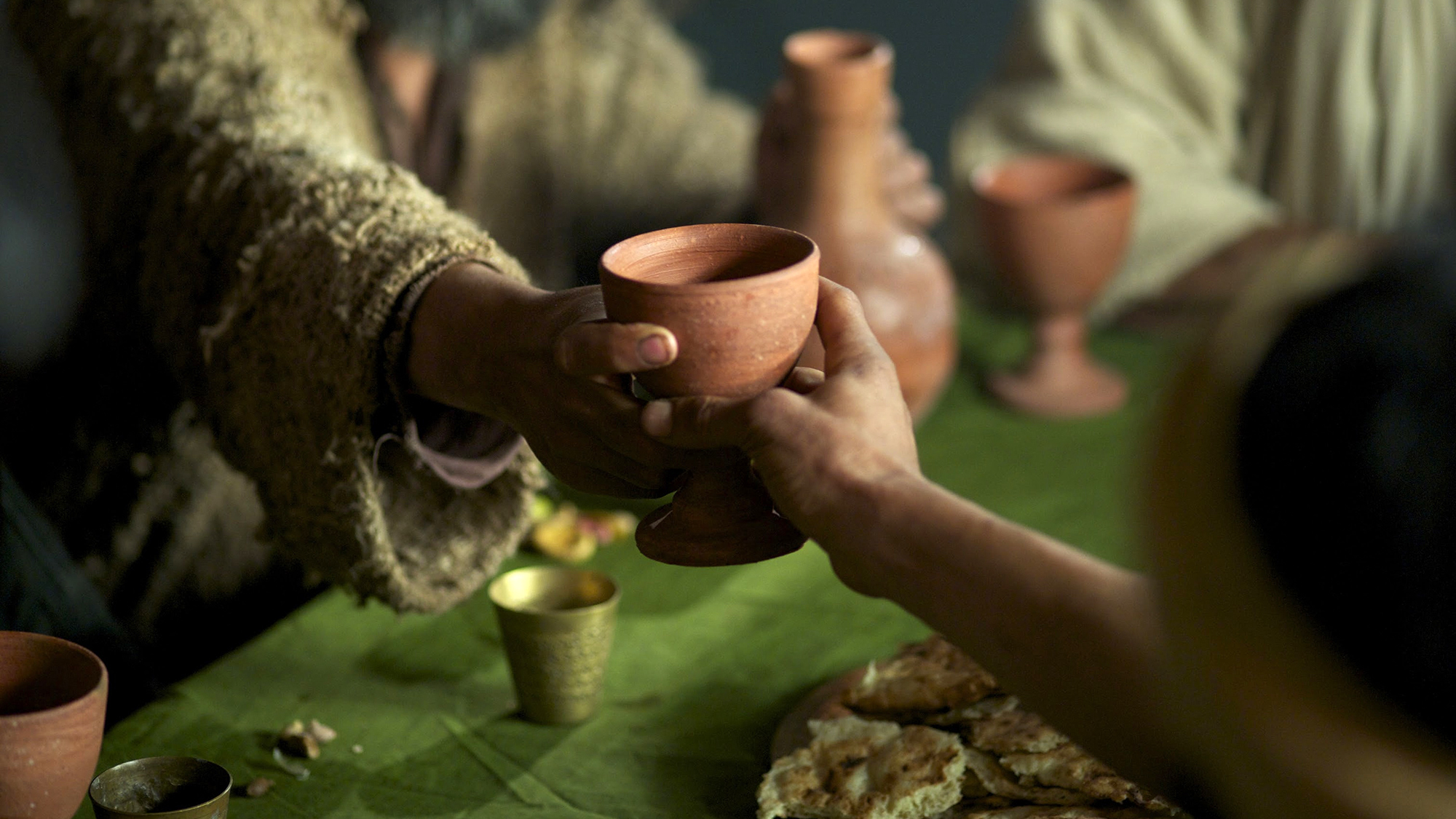Why did Martin Luther call the Lord's Supper - a Testament?

Martin Luther and Consubstantiation
With the publication of The Babylonian Captivity of the Church in 1520, Martin Luther attacked the sacramental system and the eucharistic practices of the Roman Catholic Church. In particular, he addressed three “captivities” to which the church had subjected the Lord’s Supper.
The first captivity was the church’s withholding of the cup from the laity and the administration of communion in one kind. Luther passionately opposed this practice. He emphasized Jesus’ insistence that the cup is drunk by “all” of his disciples.
He also dissented logically, reasoning that if the Lord’s Supper is given “to the laity, it inevitably follows that it ought not to be withheld from them in either form.” Most important, Luther focused on the fact that “the blood is given to all those for whose sins it was poured out. But who will dare to say that it was not poured out for the laity?”
Finally, Luther questioned why the church, if it concedes that the laity receives divine grace (the more important matter) through the sacrament, would not concede the sacrament itself (a lesser matter).86 He called for a general council of the church to put a halt to this tyranny.

The second captivity was the church’s decree that transubstantiation—based on Aquinas’s use of Aristotle’s philosophy—was the only legitimate view of the presence of Christ in the Eucharist. Like Wycliffe before him, Luther underscored the lack of biblical evidence for this position, concluding: “What is asserted without the Scriptures or proven revelation may be held as an opinion but need not be believed.”
Moreover, Luther, knowing that Aristotle held substance and accidents to be inseparable, criticized Aquinas for misunderstanding and misusing Aristotelian philosophy to explain transubstantiation, with the result that Aquinas built “an unfortunate superstructure [philosophical, rather than biblical, support for transubstantiation] upon an unfortunate foundation [a misunderstanding of Aristotle’s philosophy].”
More important, at the heart of his rejection of transubstantiation was the essential principle of interpreting the words of Scripture according to “their grammatical and proper sense.”
Applying this to the discussion of the Lord’s Supper, Luther noted: “It is an absurd and unheard-of juggling with words to understand ‘bread’ to mean ‘the form or accidents of bread,’ and ‘wine’ to mean ‘the form or accidents of wine.…’ [It is not] right to enfeeble the words of God in this way, and by depriving them of their meaning to cause so much harm.”
Luther also appealed to the history of the church: “The church kept the true faith for more than twelve hundred years, during which time the holy fathers never, at any time or place, mentioned this transubstantiation (a monstrous word and a monstrous idea), until the pseudo-philosophy of Aristotle began to make its inroads into the church in these last three hundred years.”
Luther could not subscribe to such a recent doctrine. To conclude the matter, he pointed out that “the laymen have never become familiar with their fine-spun philosophy of substance and accidents, and could not grasp it if it were taught to them.”

The third captivity was the church’s view of the Lord’s Supper as “a good work and a sacrifice.” As a result, “this abuse has brought an endless host of other abuses in its train so that the faith of this sacrament has become utterly extinct and the holy sacrament has been turned into mere merchandise, a market, and profit-making business.”
To counter this illegitimate view, Luther offered his own understanding of the Lord’s Supper. It is Christ’s testament, a promise made by him who was about to die, designating his inheritance—the forgiveness of sins—and naming his heirs—those who believe the promise of the testator.

Martin Luther’s View of the Lord’s Supper as a Testament
A testament, as everyone knows, is a promise made by one about to die, in which he designates his bequest and appoints his heirs. A testament, therefore, involves first, the death of the testator, and second, the promise of an inheritance and the naming of the heir.… Christ testifies concerning his death when he says, “This is my body, which is given, this is my blood, which is poured out” [Luke 22:19–22].

He names and designates the bequest when he says “for the forgiveness of sins” [Matt. 26:28]. But he appoints the heirs when he says “for you [Luke 22:19–20; 1 Cor. 11:24] and for many” [Matt. 26:28; Mark 14:24], that is, for those who accept and believe the promise of the testator. For here it is faith that makes men heirs.… You see, therefore, that what we call the mass is a promise of the forgiveness of sins made to us by God, and such a promise as has been confirmed by the death of the Son of God.*
Luther’s view had ramifications for how the Lord’s Supper was to be observed: “If the mass is a promise … then access to it is to be gained, not with any works, or powers, or merits of one’s own, but by faith alone.” The one who participates in the Lord’s Supper hears the Word of God with its promise of the forgiveness of sins and by faith confidently relies on this promise. This also meant that the Lord’s Supper is valid for believers only. Its blessings could not be applied to another person, so masses said for the dead were worthless.
Finally, this meant that the Lord’s Supper is not a sacrifice. A sacrifice is given; a promise is received. Ultimately, Luther challenged the church to rethink its entire eucharistic practice: “The more closely our mass resembles that first mass of all, which Christ performed at the Last Supper, the more Christian it will be.”
Although he dissented from the official doctrine of transubstantiation and formulated his own view of the Lord’s Supper as a testament, Luther continued to uphold the view that Christ was truly and completely present in the sacrament. Indeed, the sacrament “is the true body and blood of our Lord Jesus Christ, under the bread and wine, given to us Christians to eat and to drink, as it was instituted by Christ himself.” He gave several reasons for this view.
First, Christ’s words of institution—“This is my body”—were to be taken literally, not figuratively.
Second, on the basis of biblical statements that Christ is seated at the right hand of God (the expression refers to the ruling power of God, which is everywhere), Luther held that Christ is present everywhere. This shows “at least in one way how God could bring it about that Christ is in heaven and his body in the Supper at the same time.”
Third, this reality occurs in the incarnation: “Since the divinity and humanity are one person in Christ, the Scriptures ascribe to the divinity, because of this personal union, all that happens to humanity, and vice versa.”

This union resulted in Jesus’ human nature—which in and of itself is localized in one space—becoming ubiquitous (everywhere present). “Wherever Christ is according to his divinity, he is there as a natural, divine person and he is also naturally and personally there.… But if he is present naturally and personally wherever he is, then he must be man there, too, since he is not two separate persons but a single person. Wherever this person is, it is the single, indivisible person, and if you can say, ‘Here is God,’ then you must also say, ‘Christ the man is present too.’ ”
The view of Luther and his followers eventually came to be called (by its opponents) consubstantiation: the body of Christ is present “in, with (con), and under” the substance of the bread. According to the Formula of Concord: “We maintain and believe, according to the simple words of the testament of Christ, the true, yet supernatural eating of the body of Christ, as also the drinking of His blood, which human senses and reason do not comprehend.” Consubstantiation became the Lutheran contribution to the controversies regarding the Lord’s Supper at the time of the Reformation.
Allison, G. R. (2011). Historical Theology: An Introduction to Christian Doctrine (pp. 647–650). Grand Rapids, MI: Zondervan.

